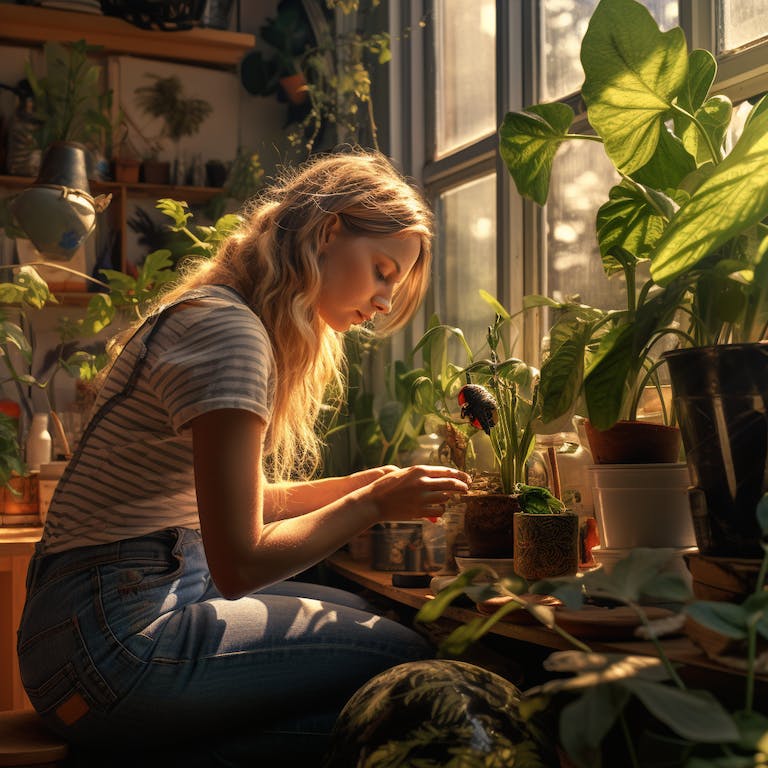Imagine turning your living room into a lush jungle or transforming your kitchen into a vibrant herb garden. The idea of growing plants indoors has gained popularity, and many plant enthusiasts are exploring ways to bring the outdoors inside.
One burning question that often arises is whether everyday LED lights, the kind you use in your home, can actually help your plants thrive. In this blog post, we’ll delve into the fascinating world of indoor gardening and demystify the concept of using regular LED lights for plant growth.
Can your favorite reading lamp or that overhead light in your kitchen contribute to the flourishing greenery of your indoor garden? Let’s shed some light on the subject and find out if your everyday LED bulbs have the potential to nurture your plants in the comfort of your home.
Contents
- 1 Natural Ways to Keep Bugs Off of Indoor Plants
- 2 5 Home Remedies for Controlling Bugs on Indoor Plants
- 3 How to Spot Common Bugs on Indoor Plants
- 4 Tips for Maintaining a Bug-Free Indoor Garden
- 5 Keeping Indoor Plants Healthy and Free of Pests
- 6 Conclusion:
- 7 FAQs
- 7.1 How do I identify bugs on my indoor plants?
- 7.2 What are some common home remedies for getting rid of bugs on indoor plants?
- 7.3 How can I use neem oil to eliminate bugs on my plants?
- 7.4 Can I use cinnamon to repel bugs from my indoor plants?
- 7.5 What is the process for making a homemade insecticidal soap?
- 7.6 Are there any plants that naturally repel bugs?
Natural Ways to Keep Bugs Off of Indoor Plants
No one likes dealing with pests, especially when it comes to our indoor plants. Not only are pests unsightly, but they can also do a lot of damage to your plants. Lucky for us, there are a few natural ways to keep bugs off of indoor plants!
One way to keep pests at bay is to grow plants that pests don’t like. Some examples of plants that pests tend to avoid are marigolds, lavender, and mint. You can also try spraying your plants with a mixture of water and essential oils. Insects don’t like the smell of certain oils, so this can help to keep them away.
Another way to deter pests is to keep your plants healthy. Healthy plants are less likely to be attractive to pests, so make sure you’re giving your plants the proper care.
This includes making sure they’re getting enough water and sunlight, as well as using the right type of fertilizer. If you notice your plant is starting to look unhealthy, act quickly to correct the problem.
You can also try physical methods to keep pests away from your plants. One way to do this is to cover your plants with a fine mesh or netting. This will prevent insects from being able to get to your plants. You can also trap pests by putting a sticky substance on the leaves of your plants. This will help to catch any bugs that are crawling around.
If you’re dealing with a severe infestation, you may need to use chemical methods to get rid of the pests. However, you should always try natural methods first.
There are many products on the market that are safe for use around plants and won’t harm your plants. If you do need to use chemicals, be sure to follow the instructions carefully and only use them as a last resort.
Dealing with pests can be a pain, but it doesn’t have to be. By using these natural methods, you can keep your plants healthy and pest-free!

5 Home Remedies for Controlling Bugs on Indoor Plants
If you’ve ever had the misfortune of dealing with pests on your indoor plants, you know how frustrating it can be.
Not only are these pests destructive, but they can also be difficult to get rid of. Fortunately, there are a number of home remedies that can help you control bugs on your indoor plants. Here are five of the best:
1. Soap and water:
This is one of the simplest and most effective ways to get rid of bugs on indoor plants. Simply mix together equal parts water and dish soap and spray it on your plants. The soap will suffocate the pests and kill them.
2. Neem oil:
Neem oil is a natural insecticide that is very effective at controlling a wide variety of pests. Simply mix together neem oil and water according to the directions on the bottle and spray it on your plants.
3. Garlic:
Garlic is a natural insect repellent that can help keep pests away from your plants. To use this home remedy, simply peel and chop a few cloves of garlic and add them to a spray bottle with water. Spray the mixture on your plants and the pests should stay away.
4. Cayenne pepper:
Another natural insect repellent that can be used to control pests on indoor plants is cayenne pepper. Simply mix together cayenne pepper and water and spray it on your plants. The pests will not like the heat and should stay away.
5. Diatomaceous earth:
This is a powder made from the fossilized remains of tiny creatures called diatoms. It works by slicing open the exoskeletons of insects, causing them to dehydrate and die. To use this home remedy, simply sprinkle diatomaceous earth around the base of your plants.
How to Spot Common Bugs on Indoor Plants
If you’re like most people, you probably enjoy having a few indoor plants to spruce up your home. But what you might not realize is that your indoor plants are also a prime target for bugs.
Just like outdoor plants, indoor plants can be susceptible to infestations from a variety of different pests. But don’t worry, there are a few things you can do to help prevent bugs from taking over your indoor plants.
One of the first things you can do to prevent bugs from infesting your indoor plants is to be proactive about checking them for pests.
Take a close look at your plants on a regular basis, paying close attention to the undersides of the leaves. If you see any bugs or eggs, you can remove them before they have a chance to multiply.
Another good way to prevent bugs from infesting your indoor plants is to make sure they are well-watered. Many pests are attracted to dry, stressed plants, so keeping your plants healthy and hydrated will make them less appealing to pests.
Finally, if you do find that your indoor plants have been infested with pests, there are a few things you can do to get rid of the bugs naturally.

One option is to spray your plants with a mixture of water and dish soap. This will kill any bugs on contact and also help to discourage future infestations.
You can also try using diatomaceous earth, which is a natural product that can be found in most hardware stores. Just sprinkle it around the base of your plant and it will help to kill any bugs that come into contact with it.
With a little bit of effort, you can keep your indoor plants healthy and free of pests. Just be sure to check them regularly, keep them well-watered, and take action if you do find any bugs.
Tips for Maintaining a Bug-Free Indoor Garden
If you want to have a beautiful and healthy indoor garden, it’s important to keep it free of pests and bugs. Here are some tips for maintaining a bug-free indoor garden:
1. Inspect your plants regularly for signs of pests or disease. If you see any, address the problem immediately.
2. Keep your garden clean. Pests and diseases are often spread by dirt and debris, so regular cleaning will help reduce the risk of infestation.
3. Use organic pest control methods whenever possible. There are many effective natural pest control products on the market, so there’s no need to use harsh chemicals if you don’t want to.
4. Be careful when bringing new plants into your garden. Inspect them carefully for pests or diseases, and quarantine them until you’re sure they’re healthy.
5. Keep an eye on your plants’ water needs. Overwatering can stress plants and make them more susceptible to pests and diseases.
By following these simple tips, you can help keep your indoor garden healthy and pest-free!

Keeping Indoor Plants Healthy and Free of Pests
Most indoor plants are relatively easy to care for and maintain, but even the most diligent gardener can end up with a plant that is less than healthy. pests are one of the main reasons for this, as they can quickly ruin a plant if left unchecked.
There are a few different ways to get rid of bugs on indoor plants naturally, and the best method will likely depend on the type of plant you have. For example, if you have a plant that is susceptible to mealybugs, you might want to try using an organic insecticide or hiring a professional pest control company.
If you have a plant that is more resistant to pests, you can try using a home remedy like white vinegar or soap water. These methods can be effective, but they can also damage your plants if not used correctly.
The best way to keep your indoor plants healthy and free of pests is to be proactive. Regularly inspect your plants for signs of pests and address the problem as soon as possible. By doing this, you can avoid serious damage to your plants and keep them looking their best.

Conclusion:
Getting rid of bugs on your indoor plants can be a difficult task. Not only are there many different types of bugs that can infest your plants, but they can also be difficult to spot. If you think you may have a bug problem, it is important to act quickly. The longer you wait, the more damage the bugs can do to your plants.
There are many different home remedies that you can use to get rid of bugs on your indoor plants. One of the most popular home remedies is using dish soap. Dish soap is a great way to kill bugs because it is a natural Insecticide.
Another popular home remedy for getting rid of bugs on indoor plants is using vinegar. Vinegar is a natural repellent for many different types of bugs.
If you have a serious bug infestation, you may need to use chemical insecticides. However, if you can, it is always best to try home remedies first. They are usually just as effective and they are much safer for your plants.
FAQs
How do I identify bugs on my indoor plants?
Look for signs like discolored or damaged leaves, tiny moving specks, or webbing. Inspect both the upper and lower surfaces of leaves and the soil around your plants.
What are some common home remedies for getting rid of bugs on indoor plants?
Neem oil, insecticidal soap, and a mixture of water and dish soap are effective natural remedies. Additionally, introducing beneficial insects like ladybugs can help control pest populations.
How can I use neem oil to eliminate bugs on my plants?
Mix neem oil with water and a few drops of dish soap. Spray this solution on the affected plants, covering both sides of the leaves. Repeat every 7-10 days until the infestation is under control.
Can I use cinnamon to repel bugs from my indoor plants?
Yes, cinnamon has antifungal and antibacterial properties. Sprinkle a small amount of cinnamon on the soil surface to deter pests and prevent fungal growth.
What is the process for making a homemade insecticidal soap?
Mix a few drops of mild liquid soap (without additives like bleach or fragrance) with water. Spray the soapy solution on affected plants, ensuring good coverage. Repeat every 2-3 days until the pests are gone.
Are there any plants that naturally repel bugs?
Yes, plants like lavender, mint, and marigolds are known for their bug-repelling properties. Placing these plants near your indoor garden can act as a preventive measure.







